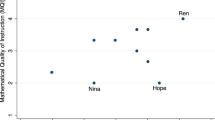Abstract
A set of instructional materials was developed for the teaching of measurement, as part of a classroom innovation for science instruction. This project involved collaborative groupings with the computer as an instructional tool for learners to interact with. A computer-based physics instruction module was developed from a physics course dealing with the concept of measurement. This paper presents the results of an empirical evaluation undertaken over a 6-week period with 118 subjects (ages 12–17) randomly selected Form I pupils in Nakuru district, Kenya. Analysis of the quantitative data showed that the intervention promoted pupils' understanding of measurement concepts and skills, in that the subjects in the treatment groups demonstrated better at the posttests than their counterparts in the true control group. Also, the learning protocols differed markedly in favor of the subjects exposed to the treatment.
Similar content being viewed by others
REFERENCES
Allessi, S. M., and Trollip, S. R. (1991). Computer Based Instruction: Methods and Development (2nd ed.), Prentice-Hall, Englewood Cliffs, NJ.
Duggan, S., and Gott, R. (1995). The place of investigations in practical work in the UK National Curriculum for Science. International Journal of Science Education 17: 137-147.
Dykstra, D. J., Boyle, C. F., and Monarch, I. A. (1991). Modeling understanding to study conceptual change in learning physics. Paper presented at the International Workshop on Research in Physics Learning: Theoretical Issues and Empirical Studies, Bremen, Germany.
Gilbert, J. K., and Watts, M. D. (1983). Concepts, misconceptions and alternative conceptions: Changing perspectives in science education. Studies in Science Education 10: 61-98.
Jackson, B. (1988). A comparison between computer-based and traditional assessment tests, and their effects on pupil learning and scoring. School Science Review 66: 809-815.
Johnson, D. W., and Johnson, R. T. (1992). Learning Together and Alone, Prentice-Hall, Englewood Cliff, NJ.
Kenya Institute of Education (1992). Ministry of Education Secondary Education Syllabus, Vol. 7, Kenya Literature Bureau, Nairobi.
Kiboss, J. K. (1997). Relative Effects of a Computer-Based Instruction in Physics on Students' Attitudes, Motivation and Understanding About Measurement and Perceptions of the Classroom Environment, DoctoralThesis, University of theWestern Cape, Bellville, RSA.
Kiboss, J. K. (1998). An evaluation of teacher/student verbal and non-verbal behaviours in computer-augmented physics laboratory classrooms in Kenya. Journal of SAARMSE 1: 65-72.
Kiboss, J. K. (1999). Relative effects of a CBI in physics on students' achievement and attitudes towards the lessons on measurement. Egerton University Journal Science and Technology 2: 57-65.
Makau, B. M. (1990). Computers in Kenya's Secondary Schools. Case study of an Innovation in Education, International Development Research Centre (IDRC), Canada.
Mullet, E. (1990). Distinction between concepts of weight and mass in high school students. International Journal of Science Education 12: 217-226.
Ogunniyi, M. B. (1986). Teaching Science in Africa, Salem Media, Ibadan.
Okpalla, N. P., and Onocha, C. O. (1988). The relative effect of two instructional methods on students' perceived difficulty in learning physics concepts. Kenya Journal of Education 4: 146-160.
Potari, D., and Spiliotopoulou, V. (1996). Children's approaches to the concept of volume. Science Education 80: 341-360.
Smith, C., Carey, S., and Wiser, M. (1985). On differentiation: A case study of the development of the concepts of size, weight, and density. Cognition 21: 177-237.
Author information
Authors and Affiliations
Rights and permissions
About this article
Cite this article
Kiboss, J.K. Impact of a Computer-Based Physics Instruction Program on Pupils' Understanding of Measurement Concepts and Methods Associated with School Science. Journal of Science Education and Technology 11, 193–198 (2002). https://doi.org/10.1023/A:1014673615275
Issue Date:
DOI: https://doi.org/10.1023/A:1014673615275



